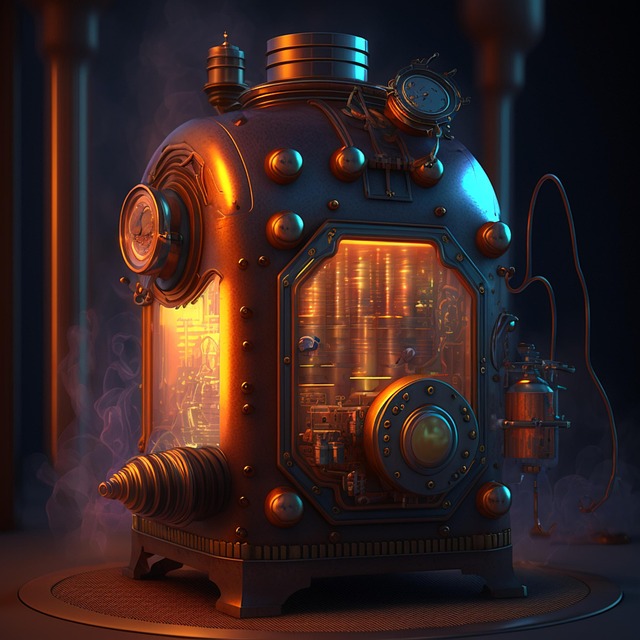The transition towards cleaner energy-efficient solutions is driving the adoption of electric boilers as a replacement for traditional gas or oil systems. Electric heating offers numerous benefits, including quiet operation, low maintenance, and reduced carbon footprints, suitable for both residential and commercial buildings. New rapid-response electric boilers address inefficiencies like long heat-up times by providing instant hot water, cost savings, and enhanced user experiences, making them an attractive, sustainable choice for modern households seeking efficient heating alternatives.
In today’s quest for efficient and convenient heating solutions, electric boilers are gaining traction. The current landscape sees traditional systems, including gas and oil-fired heaters, clashing with electric boilers’ growing popularity. However, conventional electric boilers often lag in heat-up times, leading to prolonged waiting periods. This article explores the revolutionary impact of rapid-response electric boilers, which significantly minimize heat-up times, offering improved energy efficiency, enhanced user experience, potential cost savings, and a smaller environmental footprint.
- The Current Landscape of Electric Boilers
- – Overview of traditional heating systems vs electric boilers
- – Challenges with conventional electric boilers
- Understanding Rapid-Response Electric Boilers
The Current Landscape of Electric Boilers

The current landscape of electric boilers is marked by a growing awareness of the need for clean and energy-efficient heating solutions. Traditional boiler systems, predominantly fueled by gas or oil, have long been the standard for home heating in many regions. However, with increasing environmental concerns and stricter regulations on emissions, the shift towards alternative heating methods, specifically electric heating systems, is gaining momentum. Residential electric boilers are becoming increasingly popular as a result of their efficiency, ease of use, and reduced carbon footprint compared to fossil fuel-based boiler systems.
Electric central heating offers several advantages, including quieter operation, lower maintenance requirements, and the potential for smart home integration. Electric HVAC (heating, ventilation, and air conditioning) systems are not just limited to residential applications; they also find their place in commercial buildings, providing efficient and cost-effective solutions for space heating and cooling. The latest advancements in electric heating technology, focusing on rapid-response systems, have further improved the efficiency and performance of electric boilers, dramatically minimizing heat-up times. These innovations make electric space heating a viable option for both new construction and retrofits, contributing to a more sustainable future.
– Overview of traditional heating systems vs electric boilers

Traditional heating systems have long been the mainstay in homes and buildings, relying on fuel-based boilers that heat water or steam for distribution through radiators or underfloor piping. These systems, while effective, often involve significant warm-up times, leading to inefficient energy use. In contrast, electric boilers offer a modern alternative with remarkable advantages. They are designed to deliver rapid hot water production, ensuring efficient and instant heating when needed.
Electric heating technology has revolutionized residential electric boilers and boiler systems, making them an attractive option for homeowners seeking energy-efficient heating solutions. Electric central heating, including electric space heating, provides consistent comfort without the environmental impact associated with fossil fuel burning. As a clean heating system, it contributes to a greener future, making it a viable and sustainable choice for those looking to minimize their carbon footprint.
– Challenges with conventional electric boilers

Conventional electric boilers present several challenges that hinder their performance and efficiency. One of the primary issues is the significant heat-up time, often resulting in delays when users require quick access to hot water or heating. This problem is particularly evident in larger boiler systems found in residential buildings and commercial spaces, where rapid temperature changes are demanded.
Additionally, electric heating systems, especially older models, rely heavily on conventional central heating methods, which can be less energy-efficient than modern alternatives. This inefficiency contributes to higher energy consumption and increased operating costs for homeowners and businesses alike. To overcome these challenges, a new generation of rapid-response electric boilers has emerged, offering superior performance, faster heat-up times, and an enhanced user experience, while also promoting the benefits of clean heating systems and energy-efficient residential electric boilers.
Understanding Rapid-Response Electric Boilers

Rapid-response electric boilers are designed to significantly reduce heat-up times compared to traditional boiler systems. These advanced electric heating systems leverage cutting-edge technology to deliver hot water or heat to homes and buildings almost instantly. By eliminating the need for a separate water heater, residential electric boilers can offer energy-efficient heating solutions that are both cost-effective and environmentally friendly.
Electric central heating systems, including electric space heating options, have gained popularity due to their clean heating technology and ease of use. Home heating boilers that employ electric HVAC systems can adapt to varying heat demands, ensuring optimal comfort while minimizing energy consumption. This makes them an attractive choice for modern households seeking efficient and sustainable electric heating solutions.
Rapid-response electric boilers are transforming the way we heat our spaces, offering a significant advantage over conventional systems with their ability to minimize heat-up times. By leveraging advanced technology, these innovative boilers provide faster and more efficient heating, addressing the challenges faced by traditional electric boilers. With their quick response times and eco-friendly design, rapid-response electric boilers are set to become a game-changer in the heating industry, offering a smarter and more sustainable solution for modern homes and businesses alike.
